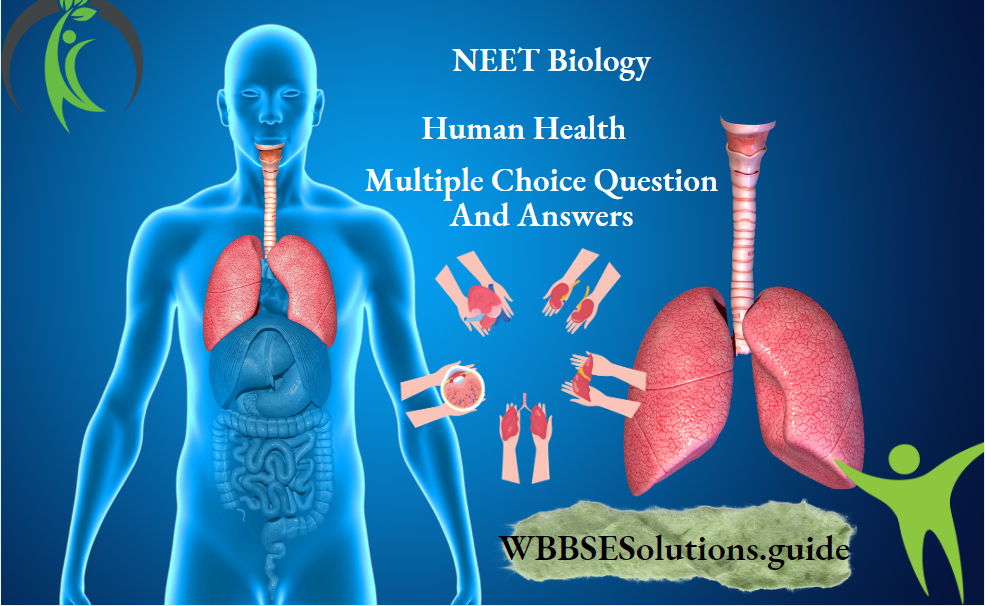Biology MCQs with answers for NEET Human Health
Question 1. __________ is a complete state of physical, mental, and social well-being of a person.
- Disease
- Health
- Infection
- Nutrition
Answer: 2. Health
Health is a complete state of physical, mental, and social well-being and not merely the absence of disease or infirmity.
Read And Learn More: NEET Biology Multiple Choice Question And Answers
Question 2. Which of the following can affect one’s health?
- Genetic disorders
- Infections
- Lifestyle
Which of the keywords given above are correct?
- 1 and 2
- 1 and 3
- 2 and 3
- 1, 2 and 3
Answer: 4. 1, 2 and 3
Health is affected by genetic disorders, infections, and lifestyle. Non-infectious diseases are caused by factors such as genetics, environment, and lifestyle.

NEET Biology Human Health MCQs with answers
Question 3. Change in genetic message causes ______ diseases.
- Contagious
- Non-contagious
- Hereditary
- Communicable
Answer: 3. Hereditary
A mutation occurs when a DNA gene is damaged or changed in such a way as to alter the genetic message carried by that gene. Once the genetic message has altered, the DNA getting transferred from one generation to the next generation will be changed causing hereditary diseases
Biology MCQs with answers for NEET
“human health and disease pyq “
Question 4. A disease that exist during or before birth is
- Congenital
- Communicable
- Non-communicable
- None of the above
Answer: 1. Congenital
- A congenital disorder is a medical condition that is present at birth.
- A congenital disorder can be recognized before birth (prenatally), at birth, or many years later.
- Congenital disorders can be a result of genetic abnormalities, environment, or unknown factors.
NEET Human Health and Disease important MCQs
Question 5. Find out the odd one.
- Haemophilia
- Klinefelter’s syndrome
- Diabetes
- Down’s syndrome
Answer: 3. Diabetes
Diabetes is the odd one out as Diabetes is hormonal disorder. Whereas other three are genetic diseases.
Question 6. Degenerative diseases are those which develop due to
- Malfunction of hormones
- Degeneration of tissue
- Malfunctions of certain body organs
- Degeneration of infected organ
Answer: 3. Malfunction of certain body organs
- A degenerative disease is a type of medical condition that causes a tissue or organ to deteriorate over time. There are quite number of degenerative diseases and many of them are associated with ageing or get worse during the aging process.
- Thus, degenerative diseases are those, which develop due to malfunction of certain body organs
Question 7. Degenerative disease affects
- Brain
- Joints
- Heart
- All of the above
Answer: 4. All of the above
Degenerative disease is the result of a continuous process based on degenerative cell changes, which will increasingly deteriorate, over time. It affects major organs like the brain, joints, and heart.
Biology MCQs with answers for NEET
Question 8. Communicable disease means Manipal 2008
- The disease is transmitted from man to man
- The disease caused by biological agents
- Both (1) and (2)
- Present from birth or inherited
Answer: 3. Both (1) and (2)
- A communicable disease is an illness transmitted through contact with microorganisms or any other means.
- People, animals, food surfaces, and air can all be the carriers of the microorganisms that pass infectious illnesses from one person to the next.
- The exchange of fluids or contact with a contaminated substance or individual may be enough to allow a communicable disease to spread.
- So it can be transmitted from man to man and it can also be caused by biological agents. It is also known as infectious disease.
NEET Human Health and Disease chapter-wise MCQs
Question 9. Diseases that do not spread from one person to another are called
- Communicable
- Non-communicable
- Infectious
- None of the above
- Answer: 2. Non-communicable
Non-communicable diseases remain confined to the persons who suffer from them. These are not transmitted from infected persons to other persons.
Question 10. Deficiency disease is
- Non-communicable
- Communicable
- Contagious
- Infectious
Answer: 1. Non-communicable
Diseases that occur due to the lack of nutrients over a long period are called deficiency diseases or nutritional diseases, so it only occurs to a person who is not taking a balanced diet and thus is non-communicable disease.
NEET Biology Chapter Human Health mock test
Question 11. Diseases transmitted from person to person due to direct contact are called as _________ diseases.
- Degenerative
- Non-communicable
- Contagious
- Non-contagious
Answer: 3. Contagious
Contagious diseases are transmitted from person to person due to direct contact.
NEET Human Health and Disease quiz with solutions
Question 12. Infectious diseases can be
- Degenerative
- Contagious
- Non-contagious
- Both (1) and (2)
Answer: 4. Both (1) and (2)
- Infectious diseases are caused by pathogenic microorganisms, such as bacteria, viruses, parasites, or fungi.
- These diseases can be spread, directly or indirectly, from one person to another. Thus, it is contagious and as it adversely affects the health, it is degenerative too.
Biology MCQs with answers for NEET
Question 13. Which is the most infectious disease?
- Hepatitis-B
- AIDS
- Cough and cold
- Malaria
Answer: 1. Hepatitis-B
- Hepatitis-B (serum hepatitis) is most infectious disease. Blood and fluids are the primary vehicles of transmission, its virus may also spread by contact with body secretions such as semen, saliva, sweat, tears, breast milk, etc.
- Infection is severe, often fatal, and is accompanied by loss of appetite, nausea, whitish stool (due to lack of bile), and jaundice.
Question 14. The diseases which are spread through contaminated water, food, air, and soil are called
- Congenital diseases
- Non-communicable diseases
- Contagious diseases
- Non-contagious diseases
Answer: 4. Non-contagious diseases
“questions on human health and disease “
A non-contagious disease is a disease that is not easily transmitted from person to person. It may require the aid of a vector (for example, a mosquito) or it may result from a shared environmental issue, for example, water, air, soil, and food poisoning, or a common travel history
Question 15. Allergy is
- Communicable disease
- Skin disease
- Non-communicable disease
- Genetic disease
Answer: 3. Non-communicable disease
Allergy means all kinds of untoward reactions manifested in the body due to hypersensitivity of substances called allergens. It is a non-communicable diseases. Allergy reactions occur due to the liberation of histamine by tissue cells.
Question 16. The smallest known agents of the infectious disease are
- Viruses
- Mycoplasma
- Viroids
- Actinomycetes
Answer: 2. Mycoplasma
- Mycoplasmas are Pleuro Pneumonia Like Organisms or PPLO, which lack cell wall and have no shape.
- Human infertility and abortions are now known to be due to mycoplasma infections of the urinogenital tract. They can pass through bacteria-proof filters.
- Thus, the smallest known agents of the infectious disease are mycoplasma.
Biology MCQs with answers for NEET
Question 17. The organism, which carries a disease from one organism to another is called
- Host
- Inoculum
- Vector
- Sterilization
Answer: 3. Vector
- Vector is an organism that transmits parasites, i.e. carries a disease from one organism to another, For example, mosquitoes are vectors of malaria parasites.
- Other options are explained as Host is an organism infected by a parasite.
- Inoculation is the introduction of microorganisms, infective material, serum, or other substances into tissues of living organisms or culture media.
- Sterilization is the complete elimination of microbial activity.
NEET Biology Human Health MCQs with explanations
Question 18. Vehicle-borne transmission of a disease is the transmission occurring through
- Certain vectors like arthropods
- Agencies like water ice, food, or blood
- Through infectious clothes
- Unhygienic conditions
Answer: 1. Certain vectors like arthropods
- Most arthropod vectors transmit the pathogen by biting the host, creating a wound that serves as a portal of entry.
- Biological transmission occurs when the pathogen reproduces within a biological vector that transmits the pathogen from one host to another.
- In arthropods, the pathogen may go through part of its reproductive cycle in the gut or salivary glands of the arthropod to facilitate its transmission through the bite.
Question 19. Identify from among the following a non-communicable disease.
- Measles
- Rabies
- Diphtheria
- Diabetes
Answer: 4. Diabetes
“questions on human health and disease “
Diabetes mellitus is a non-communicable disease. Diabetes is primarily a result of a relative or complex lack of insulin secretion by the β -cells of islets of Langerhans in pancreas. Measles, rabies, and diphtheria are communicable diseases.
Question 20. Which one of the following non-infectious diseases is the major cause of death in humans?
- Cancer
- AIDS
- Asthma
- Typhoid
Answer: 1. Cancer
Cancer is a non-infectious disease. It is the major cause of death in the human population.
Biology MCQ For NEET With Answers
Question 21. Osteomalacia is a deficiency disease of
- Infants due to protein energy malnutrition
- Adults due to protein energy malnutrition
- Adults due to vitamin D deficiency
- Infants due to vitamin K deficiency
Answer: 3. Adults due to vitamin D deficiency
A deficiency of vitamin D causes weak bones, bone deformities, rickets in children, and osteomalacia in adults. Marasmus is caused due to protein energy malnutrition.
Question 22. Kwashiorkor and beri-beri are
- Communicable diseases
- Infectious diseases
- Deficiency diseases
- None of the above
Answer: 3. Deficiency diseases
- Kwashiorkor is a malnutrition disease, that primarily occurs in children.
- It is caused by severe protein deficiency, whereas beriberi is a disease of peripheral nerves caused by a deficiency of thiamine or vitamin-B1.
- Thus both are deficiency diseases.
Biology MCQ For NEET With Answers
Question 23. Kwashiorkor is caused due to deficiency of Manipal
- Minerals
- Fats
- Dietary protein
- Carbohydrates
Answer: 3. Dietary protein
- Kwashiorkor is a severe form of malnutrition associated with a deficiency in dietary protein.
- The extreme lack of protein causes an osmotic imbalance in the gastrointestinal system, causing swelling of the gut diagnosed as an edema or retention of water.
Question 24. A specific lesion in the thyroid, involving infiltration of mononuclear cells (lymphocytes, histocytes, and plasma cells) and germinal center formation, accompanied by destruction of follicular cells is
- Parkinson’s disease
- Hashimoto’s disease
- Rheumatoid arthritis
- All of the above
“questions on human health and disease “
Answer: 2. Hashimoto’s disease
- Hashimoto’s disease (or thyroiditis) is infiltration of the thyroid gland with lymphocytes resulting in progressive destruction of the parenchyma and hypothyroidism.
- Other options are explained as Parkinson’s disease is a neurological syndrome usually resulting from arteriosclerotic change in the basal ganglia and characterized by rhythmical muscular tremors, the rigidity of movement, and dropsy posture.
- Rheumatoid arthritis is an inflammatory disorder affecting many joints, including those in the hands and feet.
